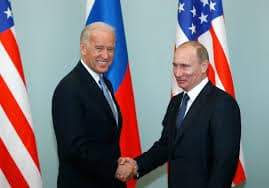Russia Envoy: US and Russia Need to Start Strategic Dialogue

Russia hopes the success of extending the last remaining U.S.-Russia arms control treaty will give a new boost to re-starting a strategic dialogue between Moscow and the Biden administration, Russia’s deputy U.N. ambassador said Wednesday.
Dmitry Polyansky told a press briefing that “there are a lot of security and strategic issues on the table,” including arms control, which require “a serious, in-depth dialogue, on equal footing.”
He said Russia is “cautiously optimistic” about Tuesday’s first phone call between President Vladimir Putin and U.S. President Joe Biden and their agreement to work together to extend the New START nuclear weapons treaty for five years.
Russia's parliament ratified the treaty Wednesday and Polyansky expressed hope the Americans will not miss the Feb. 5 deadline.
“We, of course, will be judging the new administration and its attitude towards Russia by actions,” he said. “So far, the first action that we saw yesterday is very positive.”
Despite former president Donald Trump being enamored of Putin and frequently undercutting his own administration’s tough stance on Russia, relations between Moscow and Washington were at a low point when the Biden presidency began on Jan. 20.
“For many years there was no dialogue between Russia and the United States,” Polyansky said. “There were only accusations, and that’s the problem. ... We were making proposals, but they were ignored or criticized.”
He said if the approach of the Biden administration is about “containment,” about “featuring Russia as kind of a rogue state, as kind of a country that deserves isolation, sanctions” and if there is no dialogue and understanding about what is behind the current world political situation, “I don’t think that there will be much of a breakthrough.”
“So we’re not too pessimistic,” Polyansky said. “We’re realists."
He stressed that the re-engagement of Russia and the United States in a strategic dialogue is “the most pressing issue.”
“I think the whole world is suffering from the lack of such dialogue, including on security issues, on regional security issues,” he added.
The Putin-Biden phone call underscored the troubled relations between the United States and Russia and the delicate balance between the former Cold War foes.
While the Kremlin focused on the New START treaty, the White House said Biden raised concerns about the arrest of Russian opposition figure Alexei Navalny, Moscow’s alleged involvement in a massive cyber espionage campaign and reports of Russian bounties on American troops in Afghanistan.
On each of these issues, Polyansky said, “there are a lot of allegations but there are no proofs, and there are no facts.”
Russia is told that information is classified and can’t be shared which it doesn’t like, he said. “Give us the proof. ... We are innocent unless proved otherwise, that’s our approach.”
Polyansky expressed hope that the success of New START will spur a dialogue.
He pointed to a number of Russian proposals including having the two countries make a joint statement on the inadmissibility of a nuclear war which “would bring us to the spirit of détente,” and exchange letters “on initial commitments on non-interference in each other’s affairs” which Moscow proposed in July 2018 but hasn’t received a reply from Washington.
Polyansky said Russia is also waiting for the Biden administration to confirm its desire to return to the 2015 nuclear agreement between major powers and Iran known as the JCPOA which Trump withdrew from in 2018. After Trump re-imposed U.S. sanctions, Iran started increasing the level of uranium enrichment and taking other measures beyond JCPOA limits.
“The first step would be the clear expression of the United States to come back to the JCPOA,” he said, stressing that it would be “counterproductive” for the U.S. to add any preconditions.
“The second step would be for Iran to say what Iran will do, how it will respond and how the steps it has taken will be reversed,” he said.
Photo and Link: Russia Envoy: US and Russia Need to Start Strategic Dialogue | U.S. News® | US News




